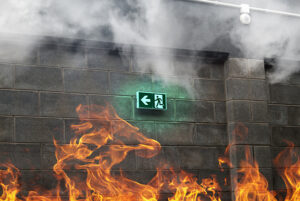Emergency Planning Saves Lifes

Download Instructor-Led Material
Meeting Kit |
PowerPoint |
WHAT’S AT STAKE?
Unexpected emergencies happen every year in this country. When you add fire, floods, airplane crashes and ice storms to the list, you can see why your company needs an Emergency Response Plan to cover all expected and unexpected disasters. For this plan to be effective, all employees must be trained in the roles they will play in an emergency.
WHAT’S THE DANGER?
You are on a construction site when someone shouts a warning. You look around and see a tornado bearing down on your work site. Do you know where to find shelter?
A freight train carrying hazardous chemicals derails behind your plant. It splits apart and bursts into flame. How do you raise the alarm?
HOW TO PROTECT YOURSELF
An Emergency Response Plan is basically a “How Do We Get Out of Here Safely” plan, which usually contains provisions for chemical cleanup or applying first aid. A good plan should anticipate all possible emergencies as well as all natural and manmade disasters that could occur.
All employees should regularly practice and review emergency response. Many workers have died because they didn’t remember the emergency procedures they read when they were hired. Only practice will expose errors in the plan which could result in lost lives.
Here are some suggestions for preparing for workplace emergencies:
Know where your emergency telephone numbers are located and which agency to contact first.
Know where the two nearest escape routes are located.
Learn to use a fire extinguisher. You should use it on a small fire only. If the fire gets out of hand, leave the area. Unnecessary heroics have killed many employees.
Learn how and when to operate internal alarm systems.
Know how to find and operate eye wash units and safety showers. These should be clearly marked and easily accessed. A worker covered with burning acid will be in no condition to search for them.
Everyone should be aware of the location of first aid supplies, and several on your crew should have the proper training to use them.
In a natural disaster such as an earthquake, flood or tornado, knowing where to go and what not to do are vital. Panic and death come from being unprepared.
FINAL WORD
Unexpected emergencies occur every day in factories, plants, offices and warehouses, as well as construction sites, airports and train/vehicle intersections. Ignoring the possibility will not prevent one from occurring. Knowing your part in the Emergency Response Plan could make all the difference.